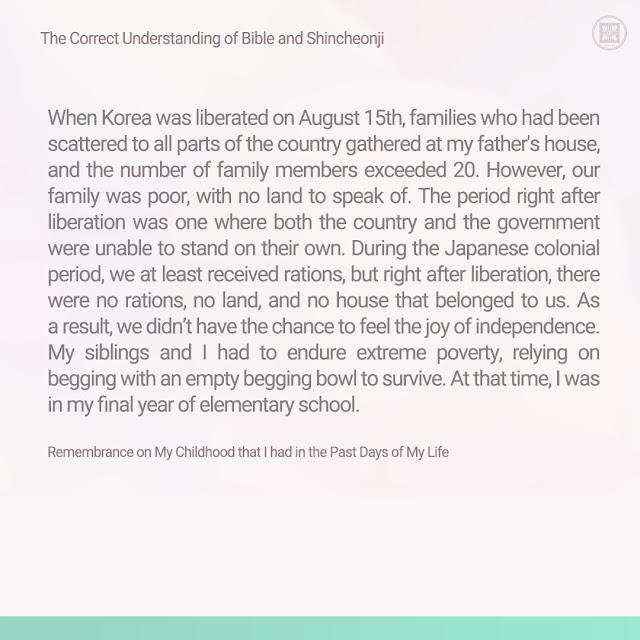Remembrance on My Childhood that I had in the Past Days of My Life
When Korea was liberated on August 15th, families who had been scattered to all parts of the country gathered at my father's house, and the number of family members exceeded 20. However, our family was poor, with no land to speak of. The period right after liberation was one where both the country and the government were unable to stand on their own. During the Japanese colonial period, we at least received rations, but right after liberation, there were no rations, no land, and no house that belonged to us. As a result, we didn’t have the chance to feel the joy of independence. My siblings and I had to endure extreme poverty, relying on begging with an empty begging bowl to survive. At that time, I was in my final year of elementary school.
At this time, not just us, but many people went back to their hometowns, yet everyone faced the same problem—there was nothing to eat. Areas like Dodong, in front of Seoul Station, Jangchungdan Park, and Pagoda Park (now Seoul Tapgol Park) were gathering spots for beggars.
When looking at the mountains, they were completely white with trees that had lost their bark. Looking at the fields, there was not a single blade of grass in sight. People had to strip the bark off trees or eat grass to survive. The ditch in front of our house was filled with water that had turned red, like blood, as pine tree bark was being washed in it. This was the life of our people right after liberation. After graduating from elementary school, my siblings and I had to go work as hired laborers in other people’s homes to survive.
Who documented the hardships and sufferings our people went through just to stay alive immediately after Korea’s liberation? Back then, instead of celebrating liberation, we were busy trying to survive by finding food. Today, we stand among the world's economic powers, but back then, we lived under the influence of foreign powers, eating grass to survive—our situation was worse than that of cattle. Do you understand this poverty? Was liberation accompanied by sorrow and hunger, by this pain? Amid this, the ideology and thoughts split, and the country was divided into North and South. Whether communism or democracy, survival came first, and filling an empty stomach was the urgent matter. Could there have been a greater trial than this? It was a pain akin to death. But thanks to the blood, sweat, and sacrifices of our ancestors, today our country has become a developed nation.
Today, as we stand among the economic powers, we must never forget the hardships of the time right after liberation, when survival was a daily struggle. Let’s educate future generations so that they remember the plight and circumstances our country faced immediately after August 15th, 1945. Also, let’s never forget the painful efforts of our ancestors who worked hard for the country and the nation. We must also become strong new vessels for tomorrow, for the future generations.


The heart of the Chairman of #ShincheonjiChurch who desires nothing more than peace and unity under God's Word.
ReplyDelete